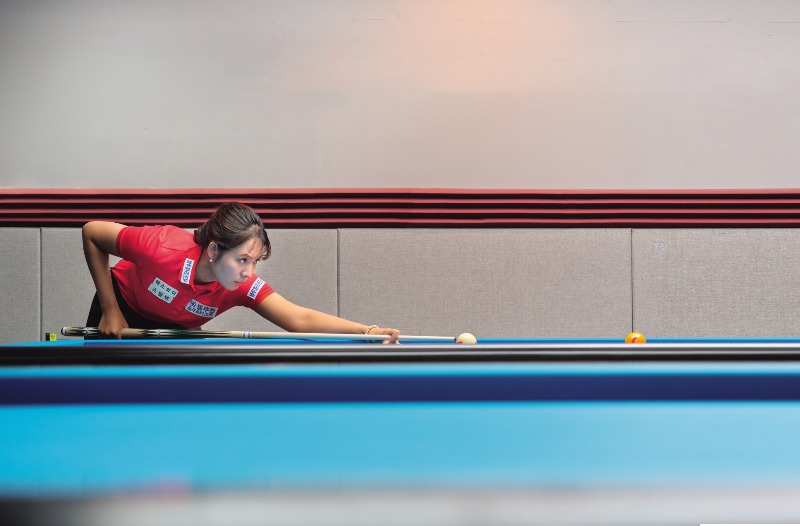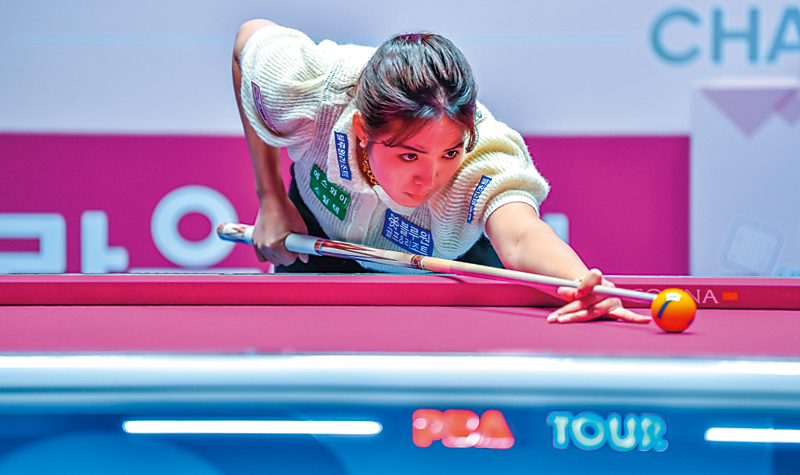Sruong Pheavy is the most admired billiard p in South Korea today. Her journey from complete novice to world champion serves as a vivid example of how hard work can lead to outstanding achievements.

Cambodian Sruong Pheavy started playing billiards at the urging of her Korean husband. In 12 years, she has transformed from a complete novice to one of the top professionals in three-cushion billiards.
In 2011, shortly after moving to Korea, Cambodia-born Sruong Pheavy picked up a billiard cue stick for the first time in her life. Fast-forward to this March, when she won the SK Rent-a-Car PBA–LPBA World Championship.
The victory was all the sweeter considering that her opponent was Kim Ga-young, widely known in the sport as an “insurmountable wall.” With a final score of 4 sets to 3, billiard fans canonized the nail-biting match as an epic encounter that will be remembered for years to come.
“The thrill of victory lingered on even after the match ended, and I cried alone a lot,” Pheavy says. “All the hard moments I had been through flashed through my mind, and I could see myself as the champion at the end of that panorama. At the same time, I felt grateful to the many people who had helped me on my path to this point, in the realization that no one knows what life has in store for you.”
NOT JUST FOR HERSELF
Pheavy is motivated by more than titles and trophies. After her husband, Kim Man-sik, taught her how to use a computer, she browsed the internet and learned about the reality of Cambodia. “I shed tears when I realized how poor my country is,” she recalls.
Kim pointed out that if she became a successful billiard p and earned money, she could help Cambodian children. “Until that time, I had only thought about helping my own family, but realizing that I could help more Cambodians with the money I would make gave me courage. So I decided at that moment to work even harder,” Pheavy explains.
At her home in Cheongju, in North Chungcheong Province, hangs a picture of Cambodian children. Written underneath it is this pledge: “I will live for them.”
Now, she uses her tournament prize money to buy supplies for the children. Her dream is to build a school in her hometown and a sports center, which would bolster Cambodia’s sports infrastructure and help develop children’s minds and bodies in a more comfortable environment.
FIRST ENCOUNTER
Coming from Cambodia, Pheavy knew she could have a higher income in Korea, but she did not envision it would be through a sport that she knew nothing about.
Her introduction to billiards came about when she accompanied her husband to one of the more than 40,000 billiard halls in Korea. She does not have any special memory of that first encounter, other than being a little bored waiting for her husband to finish playing. But Kim had unwittingly uncovered a diamond in the rough.
“He told me I should try playing, perhaps feeling sorry for leaving me bored. I just hit the ball in accordance with his instructions, but I think my husband saw something in me that I myself didn’t. When we got home that day, he asked me, ‘Do you want to be a billiard p?’”
She said no, thinking that paying for lessons and fees would only be a waste of money. But Kim persisted and Pheavy finally relented. Equipped with a 30,000-won ($24) cue stick that her husband had bought her, she began spending her days at a billiard hall.
The first years were a struggle. Learning the geometry, physics, and body control involved in a multitude of possible billiard shots is difficult enough. Learning it with a very limited Korean language ability doubled the challenge. Pheavy and her instructor initially had to communicate by drawing pictures, but as she picked up more and more Korean, their communication and her skills climbed sharply.
“Once I saw my potential, I felt a desire to make a bonfire out of this tiny ember. It was this desire that served as the driving force behind my 10 hours-a-day practice routine,” she says. Her enormous amount of daily practice eventually caused so much pain in her arms that some days she was unable to even pick up a spoon.
Kim sympathized but he subscribed to the “no pain, no gain” philosophy followed by many athletes and coaches. He never expressed sympathy, believing that only extraordinary effort could bring success. Kim also critiqued his wife’s matches, which sometimes caused friction. “At times, I would get angry and shoot back, ‘If you’re so good, why don’t you do it yourself?’ But deep down, I knew that I should do what he told me. He is someone I am truly grateful for,” says Pheavy.
PATH TO CHAMPIONSHIPS

Sruong Pheavy with her first-place trophy after winning the SK Rent-a- Car PBA–LPBA World Championship 2023, held in March in Korea.
ⓒ Park Yong-seon
By 2014, Pheavy had sufficiently honed her skills to sweep national amateur club competitions. In January 2017, she officially registered as a professional p, and before the end of the year, having reeled off a series of tournament victories, she was ranked the No. 1 female billiard p in Korea.
Being a non-Korean in the Korean billiard community was head-turning in itself. Pheavy’s meteoric rise to the top was entirely unexpected and paved the way for appearances at international tournaments.
Despite her many previous victories, the World Championship tournament was especially difficult. Even the qualifying rounds were so stressful that she could not sleep properly, and after waking up, she had to spend one or two hours taking deep breaths to calm herself. “I was so stressed that my body didn’t feel like my own. To be sure, nervousness was nothing new to me, but it had never been this serious,” she says.
Billiards is a game where the outcome depends on the correct posture and the elimination of unnecessary movement before a shot is taken. During the title match, Pheavy’s hands visibly trembled.
“When I saw myself like that, I became more nervous, and the more nervous I became the more my hands trembled. And then my nervousness increased... It was a vicious cycle,” she says.
Fortunately, she regained her composure and was ultimately able to deliver the news of her World Championship victory to her parents in Cambodia.
PAYING BACK SUPPORT

Sruong Pheavy's primary motivation is to earn prize money that will help improve the lives of Cambodian children.
ⓒ Park Yong-seon
“My husband sometimes thanks me for not giving up, apologizing for his previous nagging. Of course, there were moments when I wanted to give up too. But every time that happened, I thought about the children in Cambodia and pushed on,” Pheavy says.
She emphasizes that without her fans’ support, she would not have been able to climb to the top. That parallels with one of the aspects of Korea she finds most endearing — genuine kindness. It is far different than in Cambodia, she observes. There, someone who offers to help carry heavy luggage, for example, will eventually often ask for money, but in Korea that would not happen because help is heartfelt, she says.
“When I was going through tough times, a word of encouragement and support from my fans gave me strength. Just last night, I shed tears while reading some of their comments. Whatever you do, you cannot accomplish great things just by yourself. I realize time and again that I got to where I am with the help of many people. I want to become someone who is indispensable for both Korea and Cambodia.”